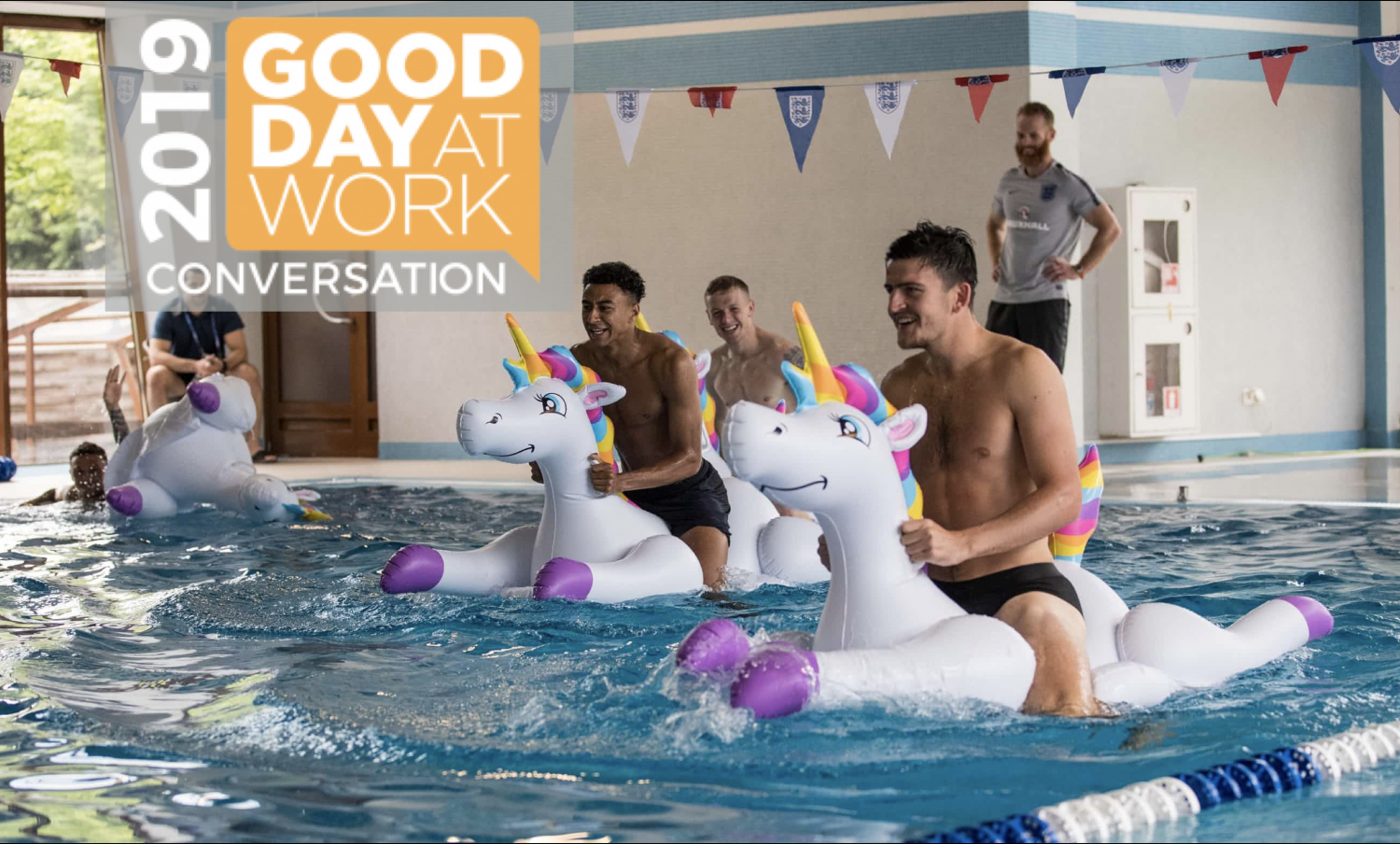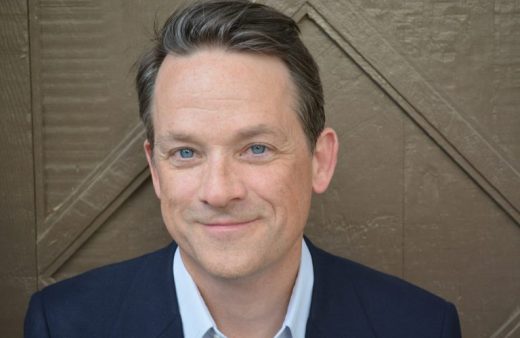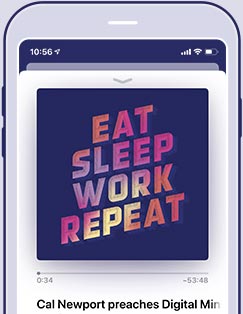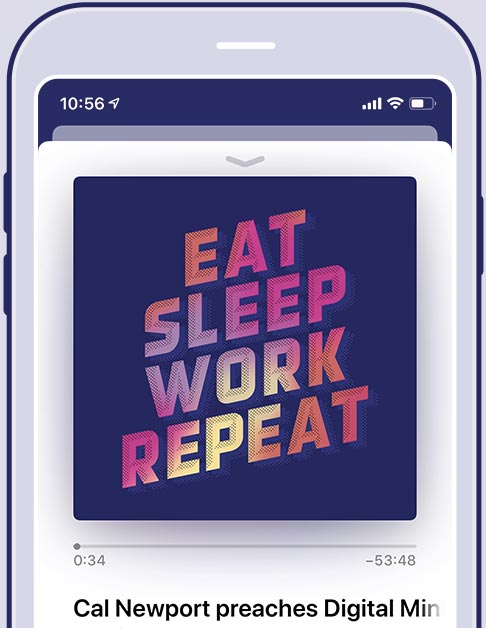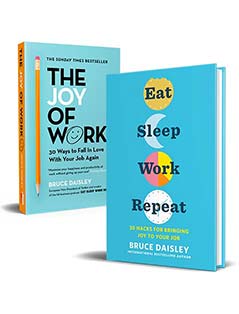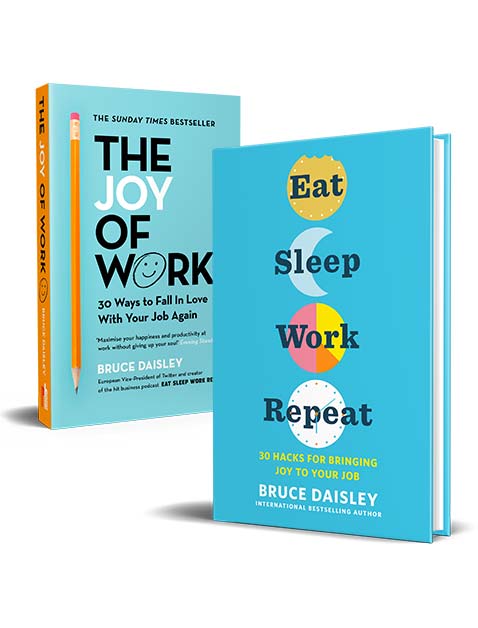Talking teams – an exclusive interview with Pippa Grange – head of team & culture at the England football team
Recorded at GOOD DAY AT WORK hosted by Robertson Cooper.
During the last World Cup, as we gradually started believing in the prospects of a team whose members had surprised us with their humour, work-rate and calm demeanour there was a wonderful newspaper article that garnered lots of attention about the secrets of their transformation.
The piece introduced us to one of the people responsible for overhauling the mindset of the England squad. Previously players for the national team had always worn the heavy expectations upon them like a stiff and weighty leather overcoat. In the recent past those called up (like Raheem Sterling) have commented that the pressure created by fan aggression has stiffled players’ ability to express themselves creatively.
The nation was collectively astonished to see a very different England mentality this time round. And, as The Guardian article showed, Dr Pippa Grange was one of the people responsible.
It was a great honour to interview Pippa at the Good Day at Work event in Manchester in September 2019. The event was fully sold out, such was the interest in the outstanding line up of speakers.
Pippa spoke of:
- the importance of cultural moments
- the very first thing she does to build a winning culture
- what it’s like to be in that room before a huge game
- the realities of being a woman in the man’s world of sport
- the single thing that is way more important than positivity
- how a big (stressful) adventure can lead to wellness
The conversation was outstanding. Pippa is outgoing from the FA as I write this – I can’t wait to see what she does next.
Full transcript below:
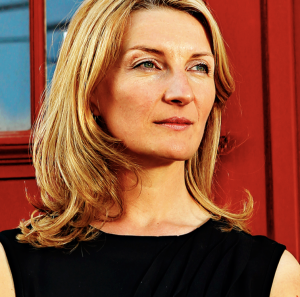
Thank you so much. I’ve been trying to get Pippa to talk to me for the last year and a half and we’ve had a couple of failed attempts so I’m absolutely thrilled to have you here today. I wonder if to kick off could you just tell us a little bit more about yourself.
Pippa Yeah sure.
I am an English woman born in Yorkshire. I consider myself a global citizen I’ve been 20 years in Australia and a couple of years in California as well so I’m recently back to England discovering the joys of winter, January February thinking what have I done. I live over in the Peak District which is fabulous and I have had a long 20 year plus career in elite sport and business culture coaching so I’m a psychologist by trade but I think of myself as a culture coach. I guess that people ask me what would be the base mantras that you have and I think that excellence can be found anywhere. Love is definitely stronger than fear when it comes to performance.
Now you have worked with Gary Southgate and the England men’s football team. Do you want to tell us what other teams you worked for the past as well.
Pippa Yeah I’ve done a lot of work in Australia – predominantly in Australian Rules football teams that many of you may not know anything about but they’re very famous. New Zealand rugby, rugby league, Australian Olympic teams and some extreme endurance athletes as well.
I think one of the first things that anyone hears about when they think about elite sport. A lot of people think ‘what’s it like to be in those rooms’. ‘What’s it like to be in the dressing room at the semi-final of the World Cup’. That stressful environment, I think probably everyone at home is imagining that, what’s it like to be there?
Pippa It’s amazing. It’s awful. It’s a mixed bag of emotions but I think the best way to describe it, is in terms of the energy that takes you through that period up to going out onto the field. A couple of hours before it’s kind of a really it’s like a really quiet buzzing vibe. People are getting ready that’s a time when they’re getting in their own zone. So you know it’s tunes, it’s headphones on. Some people sit back. Some people clown around whatever they need to do to let go of their energy to get in the right space for them. There’s a lot of sort of side chats between captain and player between coach and player that might be more tactical or you know just making sure people know what’s what’s to be achieved. The physios are strapping, the kit men are running around. It’s kind of a really interesting quiet energy, like building energy but lots of activity and then right before, after the coach speaks which is usually tactical in orientation in any sport. The pre address before you go out onto the field of play is usually quite tactical. Strong emphasis on belief, we’ll love you whatever happens. That’s good stuff to be talking about.
And then after that it’s all the backslapping. I love that bit. The last few minutes before they get out into the tunnel it’s loud. You never get so many hugs and your whole life. It’s really boisterous for a minute and then in the tunnel it’s pin drop silence. I don’t know if anybody remembers that scene from Gladiator where they’re all about to go out and it’s really like that apart from the bit where the guy pees down his leg. Not usually that but it is pin drop and it’s that excitement was built so much at that time and it’s ready. They’re ready at that point.
So explain to me what a psychologist might be invited by a rugby team or by an Olympic team. What would be your contribution that you’d be expected to deliver.
Pippa It varies depending on the team and what’s happening. If you brought in when it’s all gone pear shaped and that needs to be a series of changes or when if you brought in to keep the momentum after things are going well but I guess you do two things basically you’re working on helping the individuals in the team which is coach and player keep a cool head. Understand resilience. Understand those factors that go into high performance around motivation and good habits and coping. Being in the right space. But you’re also working on the soul of the team which is the stuff that never… I’d never put that on a resume. But that’s actually what you’re doing. You’re making sure that the tone is right, that the relationships are solid that it’s not fake. That it feels good and that people are genuinely in it together because that’s the stuff that wins.
That’s interesting. I guess ‘the soul of the team’ you might use as a synonym of culture or you know the dynamic. I think when you and I discussed before you mentioned the idea of ‘working through’. As a team psychologist I guess you can’t turn up and say our culture is now this you need to ‘work through’ other people and you need to be sort of a touch indirect. Describe to me things that you might do to work through other people and maybe explain what ‘working through’ means.
Pippa Yeah. And so in reality you know people have an impression of you spending hours a day with a player to get something right. The schedule of elite sport. It just doesn’t work like that especially in high turnaround sports like football or in international where you’re on camp and there’s a lot going on. And so, it’s so important for me to be able to work through the other people who are front line you know the. The kit man is definitely a psychologist, the physio is a psychologist, the massage person is going to be spending an hour with somebody working on their back or whatever else or their hamstrings and they’re going to hear a lot. So how do I help them get really good at culture. How do I help them do what they imagine I do. So we connect the dots so I guess most of the time I’m trying to see patterns and connect dots and if I’m making everyone else in the staff team including the coaches brilliant at culture, we’re going to be a lot further ahead.
Wow. Describe that. You’ve got the masseur, you’ve got the kit person. What would you do? Is it just about reminding them the culture or are you giving them specific messages?
Pippa Yes it’s both. The stories that we tell are just so important around culture. The narrative that is underpinning everything is massive. So I do a lot of work I’ve done that across my career. A lot of work on explaining who we are what we’re doing why we’re doing it and having everybody else in a position where – I don’t mean that they can repeat it – but they’re into it. So that’s natural for what they do to guide the player and that they involve the player in that. But also I might be helping say the physical prep, you know the famous unicorns picture or the rubber chickens at training or whatever. I get credited with that but actually that was Bryce Kavanagh who’s our physical prep guy that him in the back of the picture. He’s a legend. And you know when we talk about what is the part of the culture that he wants… what would he be seeing that was different if it was if he was really smashing it. And for him it would be full engagement and fun, they were having fun. So then we work on ‘How’s that gonna look in recovery’. You know you play a really hard game or two really hard training session, sometimes the last thing somebody wants to do (I can think of many examples across different football codes and sport where the last thing they want to do is recovery. You know it’s like ‘really?’ but he needs that to be able to for them to achieve the next day).
Where recovery is what?
Pippa Recovery is everything to get your body and mind back in good nick for the next day.
Okay describe me the relationship with fun then. So you’ve got these people in a high stress environment.
Pippa Yeah.
To some extent failure on this stage in the past has defined players’ lives to some extent. So the stakes are really high. How on earth to bring fun to an environment like that?
Pippa Well I think it’s not as hard as it sounds. I’m not just talking about this team. People are hungry for that. This is a hard endeavour to put yourself right on the line and achieve to get everything you possibly can out of your own locker and and into your performance. And so it’s a tough road for most people. So they’re really ready for something different. I think the onus is on the teams and the coaches and the people who work behind the scenes to to bring that and to allow for that.
So I think there’s a few things: firstly give permission. You don’t have to create fun. ]You create conditions for it and people will find their own fun. Play is very natural to us. I think that’s really important. But I think secondly: making sure that people feel that they can be free to be who they are. If you set conditions and the tone or the soul of the team where people feel they’ve got to be a little bit careful, cautious you know they’re on guard the whole time… where’s their little bubble of sanctuary where they can just be who they are? And they can stuff about and they can have fun? That’s so important. And you know laughter, fun, oxytocin, endorphins. It has massively positive effects on brain chemistry. Let’s us just switch out of performance mode because any time any of us stay in a mode where we’re performing all the time we’re gonna burn out or even if we don’t burn out it’s gonna be boring or much less fun than it could.
I heard you talked about that before way you said you need to give elite players a space where they’re not on stage where they’re not performing. What does that mean. Does that mean them dropping their guard or not being as conscious. What what does that mean?
Pippa It means both of those things and it means being free to be not judged on anything at any point in time. Sometimes that’s hard. I think about some Olympic sports I’ve worked in where that it’s a four year cycle to the next massive performance. Increasingly like that looming goal that one opportunity, that one open window seems so big that the tension builds and builds. But if they don’t switch out of that they’re not going to actually get there in good nick in the first place. So I think having those opportunities where they’re not on show, they’re not in the public domain and they’re not being judged on something critical that can just look like going to Nando’s and going to bed early. But how are you not judged for that evening. Elite athletes, everybody wants a piece of them all the time. Everybody wants a piece of them and then that my experience of them has been on the whole very generous and graceful with it. You know, fans media etc. But it’s so important that they just have a moment to Facetime the kids at bath time.
You mentioned something interesting along the way which was the variety of approaches. There’s not one size fits all and I guess a worse coach or worse person trying to facilitate a team might say ‘this is the way we’re going to do it’. And you talk about a variety of approaches. Is that something that you see different coaches being more or less comfortable with.
Pippa Definitely. I think it’s important to say as well with younger athletes who are still learning their craft and learning who they are and what works for them sometimes quite a structured approach matters. But as athletes get more established and they know what works for them. Great coaches let people do their own thing in that in that prep time in the run up to a game. I think it’s a real shame when somebody tries to force a method on people who actually know what works for them. It takes them in the wrong direction.
And so. Along the way you’ve worked with some incredible coaches and some coaches who achieved incredible things. Can you start to let us understand how the best of them start building a winning culture. What what are the actions they would take to do that.
Pippa The first thing to say is that the coach in a team is the custodian of the culture. He or she needs to be talking about it. They need to be explaining why it matters what it is how it feels.
So would they specify ‘our culture is this’?
Pippa They would… in an ideal situation they would be specifying ‘these are the things that we care about’. You can’t impose culture, like can’t impose values but you can inspire them and storytelling is a great way to do that. Where I’ve seen coaches tell stories about what matters and why this game can be what it is. And why they want to go about something a certain way and what matters to them that usually gets the best outcomes. And I see them also role modelling. I see them role modelling vulnerability. I see them role modelling standards. I see them role modelling tough moments. A coach I really respect in the AFL in Australia. I remember seeing a piece where they had just lost the Grand Final. It was devastating for them and he had a moment of leadership that I think was brilliant cultural leadership where he actually said at the end of the game in the room where it was dire. He said ‘I don’t know how to lead you now boys. At this moment in time. What I can tell you is that I’m super proud of you and I’m inspired by your effort. But right at this moment I don’t know how to lead you’. And I thought that was wonderful role modelling for culture.
Wow. And certainly something that will go forward with those being because when you and I spoke in preparation for one of the multiple attempts of trying to do it to get you, to pin you down I said it must be really important to build this positive culture and this sort of positive thing. You immediately sort of demurred and said ‘well look resilience is far more important than that’. And I wonder if you could give us a perspective on how you see the balance of those things and why resilience is so important.
Pippa I think resilience is probably the cornerstone piece in a journey that is uncontrollable, unpredictable and involves a lot more luck than we’re comfortable talking about. When we talk about performance on the field of play or in business in fact resilience for me is about not just the ability to bounce back from something that’s gone wrong. Somebody explained it to me once as you know the difference between mental toughness and resilience. Toughness is kind of like a block of concrete – it’s immovable, it’s hard. Whereas resilience is more like a sheet of flexible steel and it’s got give in it. And I really like that because resilience requires us to have moments where we’re on the lower side of okay as well as the moments where we can come back from that. And I think sometimes we get a little bit caught in the idea that resilience means always positive, always okay, always brilliant. And that’s not what it is. When we can approach difficulties with a challenge mindset when we can know which of our own skills we can draw on to get through something that’s difficult or to plan for something that’s going to be difficult. And when we can also understand our energy and environment. I think that contributes to resilience and it’s probably as much as anything it’s a concept and a construct. But we can, when we have learnt it through experience I think we start to understand that that’s the cornerstone.
I wonder to what extent as well – for young players especially – witnessing the narrative of someone like Gareth Southgate whose penalty miss in Euro 96 potentially cost England the whole tournament but at least cost them the place the final. And his story is one that’s imbued with this sense of being on a journey that hasn’t always had… he was fired as a coach for Middlesbrough… It’s had some downturns as well as upturns. How important is that for the credential of any coach that sense that they are flawed and human. Does that allow people to access that resilience a bit in a second hand way?
Pippa I feel that leaders… when somebody has faced adversity, leaders learn from that or build resilience from that when they have actually reflected on what it means. So where they’ve been able to understand it file it, makes sense of it and move forward from it. Negative event, a failure, a loss adversity of any kind doesn’t necessarily lead to resilience or doesn’t necessarily lead to an improved leader. There’s a piece in the middle which means how am I going to reflect and make sense of this and put it in its right place. When you talk about a coach who’s experienced adversity I think that the the critical bit of resilience build is ‘how are they making sense of what happened?’ But most people who’ve been on a performance adventure through life or has really gone to the edge of their capabilities and strives regularly for excellence. They’re going to fall in holes now and then it’s inevitable. It’s kind of part of the journey.
For a leader to be credible does failure actually enhance the credibility of their story. Does it make them more relatable. From a team’s point of view.
Pippa I suspect it does make them more relatable. As long as they’ve worked out the failure they’ve learnt the lesson. And as long as I can tell the stories about it well. Failure is one thing. We always admire people who’ve faced into adversity and whether they’ve succeeded or failed the fact that they’ve had the courage to face into adversity that most of us wouldn’t or couldn’t we admire that. But then if we admire from afar is much less powerful than if that person has a vulnerability to stand up and talk about that and not with loads of gloss – in a really real human way to talk. I think Brene Brown taught us lots about vulnerability in that way. And that sort of idea that if you want to be whole and seen as somebody who can be resilient to things like shame or too resilient to pressure in some ways then you’ve got to also be willing to be vulnerable.
Now on the subject of Brene Brown, Brene Brown is world renowned for the idea of vulnerability. Maybe leaders (and everyone) showing their their flaws as well as their strengths. Brene Brown actually quoted your work, in a speech in Australia she talked about your work and I think she gave the example about penalty shootouts. She illustrated that the most significant thing in a penalty shootout out is the player who misses the penalty isn’t fearing being rejected by the group right. And is that right. What did she talk about. Why was she mentioning you?
Pippa Why was she talking about me? Yeah I really felt like I’d arrived when she talked about that. What she said, basically it was a conference in Australia or a session she did in Australia, and she said that her observations of what happened last summer were that it wasn’t necessarily the fact that somebody had worked out how to keep a cool head while the person’s putting it in the bottom left top right, whichever. But it was more about the fact that the level of risk that you had to take at that moment was buffered, and improved your ability to do that was improved by the fact that you knew you’d still be loved whatever the outcome was you’d still be worth something. You wouldn’t be rejected you wouldn’t be less. You would have had a failure in the moment but you wouldn’t be less.
That’s really interesting. Example because oxytocin the chemical that you mentioned before has this strange impact is sort of the love hormone So oxytocin makes us feel immense connection with people – I suspect all the touching that you describe in the run up to a game is all about oxytocin – but it also makes us immensely tribal. So you know mums with babies have loads of oxytocin but that means they’re very protective of their baby and they’re sort of hostile to people around and I suspect then if someone misses a penalty there’s a risk if you if you get it wrong that the oxytocin will force that player away from the group.
Pippa Yeah definitely. And I think about the Rugby World Cup that England won. The Jonny Wilkinson kick. The smart things to understand about the psychology where whatever the outcome for that person is, how are they connected to the group before and after the event. You know oxytocin is huge in that. If somebody feels like okay I can go back to my pack or I’m coming from my pack I’m standing with my pack at that moment. That’s that bond is critical. So it’s a big deal.
An immensely male world that you’ve chosen to work in. You know all of these professions are filled with masculinity, testosterone. What’s it like to be a woman in those environments?
Pippa The women’s games coming it’s coming. It’s yeah it’s been a really interesting journey. I mean I’ve got to say at the outset that on the whole I felt really welcome and respected most of the time. But it is weird, it is weird. You know I can think of a time with rugby league guys in New Zealand where their ritual is to (when you join the team) you have to sing at the front of the bus still makes my heart lurch when I think about that. And also they do a Haka and you’re in the middle but you’re in the middle in your undies. And so I’m like ‘Okay we need to adjust this slightly’. So I’m in the middle and they’re doing the Haka around me which is an amazing privilege, its an amazing sort of welcome an embodiment you’re embodying the team, you’re ‘in’, you’re family. But I didn’t do the undies. So you know you there are things where they kind of go ‘okay. How do we how do we do this with her? Because quite often I am the only woman or I love it when there’s another one or two women in the staff group and generally that is a sanctuary for them too. There’s many times where they sort of initially they they sort of think ‘okay we don’t know what to do with you’. I think the fact that I’ve got doctor in front of my name and people don’t know what psychologists do, makes it like I’m even more weird and scary initially. But actually I think the way I operate as a woman, and the difference has created enough of a pause in the hyper masculine environments for me to do good work. I think that they’ve they’ve been willing to sort of cock their ear and listen for a minute longer maybe, because of the difference. That’s just the door opener. If you can’t operate in that world after that, you need to be able to adapt and adjust. And so do they. But there’s many times sat on the kit box outside the rooms otherwise you’re going to get a 21 Bum Salute. And I’m like this is not good for anybody. So you have to be very mindful, a lot of the time, of those differences and super respectful of the athletes in that respect and I think that that pays dividends. And sometimes it’s a hard thing to walk into a… in Australia working in Aussie Rules… to walk into the coach’s box and sit in the coach’s box with another six guys who are gonna be chucking Coke cans and highly emotional and you know stressed and all sorts of things. It’s a hard thing to walk in there and feel that you fit. And I do I feel like I fit? I usually feel like a visiting pilgrim. Not quite fully belonging in the in the boysiness but that difference is why I can do good work.
There’s a really interesting book by a guy called Owen Slot called The Talent Lab and it sort of looked at Olympic athletes and their performance. And the one thing I was saying to you was that they looked at British athletes. In the analysis, they did 16 of Super Elite athletes – so these are people who were medaling at Gold – had experienced critically challenging events in their development (which was a death of a parent or a suicide attempt or bullying) but only four of the elite athletes (the ones the level below had). So I was saying that this is a sign that almost specifically ‘what doesn’t kill you makes you stronger’. But I think you had an interesting take on that.
Pippa Yeah I was saying that you know there’s been some parallel research to show that while that may be statistically true and certainly the ability to overcome and make sense of a negative event and add it to your resilience pantheon is a valuable thing. What that research doesn’t actually show is how many of those young people had a really strong mentor or had family relationships that were very supportive (not necessarily with a parent but extended family relationships or coach relationships) that really help them overcome or had some other factor of stability and coping that really helped them. If we only look specifically at the adversity or the tragedy that somebody went through and don’t look at all of the things that help them get through that we get quite a skewed picture. So it’s not just the talent gene or the talent code per say albeit important it’s always broader than that right.
That’s the importance then of great mentorship great coaching. Just looking at those stats: trauma doesn’t lead to a champion. It’s survivors’ bias…
Pippa Not in isolation. Yeah.
The working through model for me is about ‘seeing through’ its tough work doing culture work, its isolating work. As we’ve talked about I think seeing through is about knowing what you want. That might not be on the page. Knowing what you’re really going after. How many plans do we know really that say you want people to feel less fatigued at the end of the day or more willing to be vulnerable or that the soul of the team seems a bit better. It’s just not going on the plan for most organisations or teams. So I think an important thing for a culture coach is to be able to see Beyond and keep their eye on that Beyond and know that nobody is going to understand that for now and I’ll only be understood really retrospectively in most cases when it’s proven and done and then they won’t remember how you did it.
And tell me this from your perspective can you improve the culture but lose a game. Is it like a long term thing?
Pippa It absolutely is a long game. Yes. You can improve the culture and lose a game. The example I gave of coach Nathan Buckley before was a culture improvement and you can win lots of games and not improve the culture at all because winning is not the same as good culture. The two go hand-in-hand and they’re not necessarily quite causal – culture doesn’t cause winning. But sustained winning is absolutely underpinned by good culture.
There’s a really interesting thing. I spent some time this summer studying the culture that Jürgen Klopp had built Liverpool. And one of the first things he did when he went to Dortmund his team before Liverpool. He told the people around him… he said we need to move the culture from “me” to “we”. We need to move the culture from everyone feeling like they’re individually outstanding athletes to people feeling like they’re part of something bigger than themselves. But where does the line with “We” end. Is that the 11 players on the pitch or the 22 players in the squad or is it those people plus the coaches? Or where does it end?
Pippa I think the strongest teams I’ve seen there is a ‘we’ that is the whole performance group. When somebody crosses a threshold and goes onto the field of play It’s them isn’t it like this. There’s nothing the coach can do from you know from the sideline at that point or the psychologist or anybody else in fact can do at that moment. It’s them. But if they have an understanding that they belong in something bigger they have an identity connected to more people that are absolutely looking at the same things that they are, absolutely sharing their dreams and there for them good bad or ugly. That is extremely helpful in maintaining a sense of motivation. Especially when things aren’t going very well. So for me great culture looks like ‘all of us’. But then there are moments in time where you pass the baton to the captain or the leadership group or in business the unit that’s doing the work and know that they know that you’re standing on their shoulder even if you’re not physically there doing the work with them.
Because one thing Jürgen Klopp did is that he used to take his players (because he had one issue at one stage where fans have been leaving the game before the end. He introduced something where at the end of the game he would take the players to to cheer the support. The England team did that to some extent but it went beyond the players. There was physios on the pitch, the was medics on the pitch. I’m not sure if you’re on the pitch but the wider team was there, which is an interesting mindset isn’t it because it is trying to label that there’s a whole family that’s producing all of this. What would be the mentality that goes into a decision like that?
Pippa I think the idea that a broader group than the people who have just won or lost. All of us are in it. And if you know that people are in the trenches with you genuinely then there’s a sense of safety created by that, a sense of home a sense of belonging that’s very comforting for people. I think the England cricket team this year – as well – have shown some really good examples of that. The team behind the team or team within the team that have been super beneficial.
You put me on to a book that had a quotation by Ted Hughes in it. A quotation by Ted Hughes the poet was that, it was “The memories that are the worst for us and the best to remember”. Almost those bad experiences define us. They build the resilience in us.
Pippa As long as you make sense of the lesson. If a team’s failed. If a team’s had a shocking season or successive shocking seasons and then we just say okay let’s let’s just learn from that and move on. Well you know what’s changed? The reflection hasn’t happened to understand why it didn’t go well or what you want to do with that failure. Failure is very instructive for what you do next. Failure is a brilliant teacher but you it’s a hard teacher because you only work it out after the fact. You’ve got to go through the test before and the pain before. Before you sort of work it out. But that’s so important that we actually spend the time to make the lesson of what happened – when I’ve done this many times in different sports – but when you come back off a big event a World Cup or an Olympics or something like that the emotional hangover work that we do is really important. You do that work if you’ve won or lost right. How do I make meaning out of this? What are the lessons I’m going to take out of this? Because it’s too easy to go it’s done. Full stop. Move on. Whether it’s good or bad you know because of the exhaustion and because you you’re emotionally drained so you leave it some time come back and make sense of it. You make lesson with emotional hangover work.
Tell me when you first get involved in a team. Are there any things that you immediately look for? What are the characteristics of really successful teams that you maybe try to introduce.
Pippa The first thing I always look for is the quality of relationships. Two things actually. Who’s in good relationships and where are the relationships sour. Or tense or not yet connected? Because that’s everything in high performing teams. It’s relationship work. And the second thing I look for is where the power is and the power isn’t necessarily with the top guy or the coach or captain. The power might be in a really an old hand. A veteran – somebody with real battle scars who’s very revered in the team or feared in the team – or it might be with somebody who’s really disruptive in a team who’s a troublemaker and gets in the way of culture but nobody knows how to deal with them. So I look for where who’s got the real power and the quality of relationships because I think unravelling those two things is key.
And what what would you do in that situation? You’ve looked at the power of communication, you work out how you’re going to get communication improving but what what would you even start to do?
Pippa Address it. You’ve got to name it. That’s where that’s where the courage bit comes in because it’s not always about sort of glorious efforts and big speeches or brave moves straight up. It’s how will I find the moment to go address something with the coach, with the coaches because they’re always the play makers in culture? How will I bring this up? Not whether I’ll bring it up but how will I bring this up? How will I draw attention to this and you’ve got to do it with passion – but compassion too – it’s a non-negotiable but do it with loads of love and support. The idea of me as an ally for getting better but you’ve got to actually name what’s not right.
You mentioned it’s like a broader family. How important is the leader specifically in hammering things home makes you feel. It feels like there’s a balance where it’s not just one individual but then to some extent there’s moments where it really probably is one individual.
Pippa The leader. The coach is the leader of the culture. He is the author or she, the orator for culture. And I think that that’s a really important role of the leader in any team in business or in sport. If that person is the storyteller and leading people in a direction then it’s very easy for other people to follow. So yes it is ours, it’s the performance group’s, and there are moments where the player or the individual business performer is there on the line. But actually that sense of the culture being narrated by the leader is critical.
And tell me this, I wanted to get a quite vivid story in my head. We talk about storytelling but has the leader had been quite intentional about thinking ‘what story I’m going to tell right now’ or ‘the way I’m going to try and create this moment’. When you were describing the scene in a dressing room before my heart was beating I can’t imagine what it’s like to be there when it’s real life, the leader must have thought about these moments I’d have thought.
Pippa Yeah I can think of some examples – you know – in Olympic sport particularly where this is crafted a long time in advance. Well two things. The practice of standing and talking intimately and authentically about how they feel and what they care about and why they’re proud and what didn’t go well. And honestly giving feedback that’s useful. That practice is really important. If you have a situation where the leader goes missing in terms of the storytelling and in terms of speaking about the culture and describing what’s happening (even though it might seem obvious) that can be really detrimental in moments of high pressure and high performance. If a leader defers to doing the technical work, if a leader goes and sits in the middle of the orchestra rather than conducts out the front that can be really detrimental because people need that guidance at that point of pressure. It seems like such a simple thing such at almost a humble thing to do to stand and talk about what’s happening when people can clearly see what’s happening. But it’s immensely powerful in my view.
It’s almost like then this leadership, and building this cultural leadership, there’s broad thematic things that extend ‘behaviours we support’, ‘actions we take’, ‘what our culture consists of’ but then it’s about being very intentional that there are going to be some real high point moments and we need to be very clear about what we want that moment to feel like and look like.
Pippa Yeah definitely, thinking about a couple of Australian teams that I worked with where things were pretty pear shaped at half time. Two different examples of how coaches dealt with that. And one where the coach was a more extroverted really strong orator and stood at the front of the room and spoke Churchillian like about what you know what he was proud of and what he believed in in the team and it gave them enough to get back out there and focus so that they could carry on the game. Another person who was much less extroverted but really highly regarded and highly loved and respected by the players took a chair and sat in the middle of the circle of players halftime and just said, “Boys what do you think we need to do next? Here’s the story I’m seeing unfolding, here’s what my view is but you’re out there with the mud on your boots. What do you think?” But he still narrated the story. He still orchestrated the story.
Yes in moments, I suspect all of us have moments where we feel more or less introverted or extroverted. That big tub thumping, shout it from the hilltops seems quite daunting a prospect for us as a leader to go… number one I need all the answers, I need be really convincing and quite lyrical in the way I say it. It’s quite a daunting prospect whereas that second model which seems I think probably more easily accessible… does that work as effectively?
Pippa It works if it’s true for you. The whole strength in the ability to tell stories and be believed is if you’re being yourself. If the player can feel you as authentic. Players like most of us can smell a fake a mile off. They don’t respond to in authenticity or overengineered over glossed dramatics. But if that person is genuinely impassioned at that moment and is likely to be fairly extroverted normally – I imagine that’s how Klopp normally is – he describes himself that way and even in the podcast that you had done. I think that if that’s his way then that’s the right way to address it. If it’s not the next person’s way do it your way.
It’s an interesting thing that we were also talking about before which is the power of oxytocin and oxytocin and is this all the love hormone. If we activate it we feel this affinity with the group. And so I suspect if you’re doing your job well then these oxytocin activated and people feel incredibly bonded when the other elements of oxytocin. Witness a mum with a baby. There’s an incredible bond. But the mom is incredibly protective of anyone else she’s not extending love to the wider world. So it’s like…. it’s tribal. And so the thought the challenge of say the England football team is that you’ve got day to day these people who might play for Manchester United, Liverpool, Manchester City and the oxytocin in their system there is telling them to hate each other and then you gather them together for a tournament. Suddenly this person they’ve been told they need to hate suddenly they’ve been told ‘Okay I need to feel an affinity’. How do you overcome that sense of inner conflict.
Pippa Yeah I saw this probably most voraciously in Olympic sports where people were literally competing with each other for funding or a spot on the team. But they were supposed to be a team and they were going to the Olympics or the next guy. And that was very tough. But I think the anything you can possibly do is elevate it to an identity, that is in that case a national identity that is bigger than the individual identities or areas that they come from. So if there is something that they want to belong to that is appealing that they can love and that they can connect to in a really deep and meaningful way and feel that the people who went before them and the people that came after them will still will also believe deeply in that thing. It’s precious. That’s probably the only thing from an oxytocin point of view that can generate that level of quick loyalty in terms of well-being. That is also something that they feel good about which you know there’s there’s less struggle in that.
Now I saw this picture. When there was an article about the England’s journey to the semi-finals of the World Cup this picture came out of describing the picture for people who can’t see it. So this is a series of England players on inflatable unicorns appearing to have a magnificent time. I don’t know what you’re allowed to say what you’re not let’s say. How would a situation like this come about. What’s the thinking when something like this happens.
Pippa I need to say first of all I did not do the unicorns. That was Bryce Kavanagh who’s a physical prep guy. He’s a genius and that was his idea. The idea for anything like that you know whether it’s this team or in many others where we’ve done similar things over time is that, can you create the conditions for somebody to have a laugh. Can you allow people to release tension and to just feel like ‘Okay we’re done with that performance’, ‘we can reset, we can have some fun, we can just be’, ‘we can just have a moment where we don’t have to be on show where we don’t have to be perfect, where we don’t have to be striving to achieve something, we can just stuff about’. One of my favourite examples was before the New Zealand Australia Rugby League World Cup final in 2013 we were a few days out from a massive game, I was with New Zealand. There was a lot of tension in the camp. The arrangement was that we were gonna go to a haunted house in London. So we’ve got these enormous burly tough guy, a lot of those men had had quite tough upbringings. They were resilient to say the least and physically very, very robust but on the bus on the way to the haunted house there was all manner of giggling and all sorts of like ‘okay I’m not going at the front, you’re gonna go at the front’. and you know and and even the car I had to go at the front which is pathetic and I have never heard such high pitched screams in my life. But it was just such an enormous tension release. You know they had heaps of fun for a half hour and then had a Nando’s and went home and went to bed and it was a couple of days out from a game and it was a really good reset. Sometimes I think we drive really hard for just like the next thing. We’ve got to stay focussed and stay in the zone. But in reality you can’t even stay focussed for more than 90 minutes you know. So it’s a ridiculous idea. We have to understand the flux of our psychologies and our ability to stay in an emotional state is not static. You’ve got to surf with it.
Pippa Those moments where we can create fun or an opportunity to break out of the deep focus are hugely powerful in performance.
It’s really interesting isn’t it because I guess if you were sitting there and scribbling notes today. It’d be like ‘yeah, it’s all about those leadership moments, all about the hitting people with this powerful leadership message’. But it’s almost you’ve got to think exactly like you say it’s like the flow where’s the moment where everyone can just relax and things don’t matter. You described it to me as ‘the other 22 hours’.
Pippa Yeah, that’s actually that was a term that Bryce used as well. The other 22 hours is sort of an idea that your actual peak performance moments, whether it’s in business or in sport, are relatively small in comparison to what you doing with the rest of the day. And if we try and stay in a performance zone all the time. There’s no quicker route to burn out or boredom than that. So we have to recognise that there’s off time. There is a peak performance time, there’s a build up and readiness time and there’s an off time, and a recovery time. And that’s the same for all of us in life. You know if we don’t think of recovery time if we don’t get adequate sleep and nutrition we’re not recovering properly. But if you don’t have moments of freedom from your performance you’re unlikely to be able to garner the same kind of levels of performance and input then you could if you take the break.
Now I guess that brings us on to how that can be dysfunctions in leadership. Football managers and sporting coaches always seem to have such intensity. Almost they’re not permitted to be seen laughing. In fact you know you occasionally get footage of people on the bench of a football game laughing and fans are unforgiving of that. When it comes to having that balance, having that downtime are managers getting better at modelling the balance of their own performance.
Pippa Same question for the CEOs and CFOs, I think that the more that we understand about how performance works physically and psychologically the more that’s got to be a no brainer. One thing I talk about is Psychological Space which is the idea that it’s not just the things that you add to your calendar that you will do like ‘go for a walk at lunchtime’ or ‘make sure you have breakfast’. They’re important but it’s also ‘where is the time for psychological space’.
Meaning what?
Pippa Psychological Space to me is a mental freedom. It’s about where you can be something other than a performer for that moment in time, where you genuinely turn off. For some people that looks like ‘okay I’m having a mindful half hour’ . Other people that might look like ‘I’m gonna be a mum or a partner for the evening’ and the rest of it’s turned off. And I think that’s super important. And while it may be that we don’t spend as much time on the rarity of the time spent on Psychological Space. It’s almost higher value than the time we spend on that on the foundational pieces of physical stuff like sleep or nutrition or exercise.
But I guess the challenges is it appears to have lower return to it. It’s almost the benefit you get from that psychological space is almost intangible and invisible.
Pippa Yeah or it’s hard to measure isn’t it. As most things in culture and psychology are actually quite hard to measure but we know how it feels. If you have moments where you don’t feel consumed by performance if you have moments where you find yourself daydreaming or having a laugh or engaged in something else that’s just more spacious for you. We know how that feels. I think is really important that we don’t try and quantify everything that goes into performance, wellbeing or culture because a lot of the stuff in that field is not quantifiable and we actually reduce it too much when we try.
On the subject of that really, you’ve been at this semi-final of the World Cup pretty other than the final the biggest sporting event in the world. You’ve also worked in a fast fashion. You’ve worked in a real job that people here can connect with. Give us the things that we should be right in drawing inferences from and what the cautionary notes. How is sport completely different to business how is it similar to business.
Pippa A couple of things on how is it completely different. The one thing about sport is that the performance cycle is very clear. The Grand Final or the last game of the season is on a set day and you know therefore that the build up to that if there is ramped up energy and intense focus for a period of time towards, that you know there’s an end point. And then there’s a summer break or a winter break. Ideally there would be a winter break in football. It’s coming. So you can commit to the build up because there’s a time out. Whereas in business the cycles of performance don’t tend to work like that. It’s ongoing. Once you’ve had a great quarter the next quarter starts the next day. Your numbers might be good today. You might be rating green today but tomorrow you’re in another cycle. So there isn’t the downtime or the the natural cycle of performances finishing in business as there is in sport which if you try and approach it the same way of that ramped up hyper focussed energy for a period of time – the Olympic performance – I think it’s a quick road to burn out. Another thing is in sport the cause of poor performance is quite visible. It’s between the buzzers, it’s on the court the coach is watching it and you know potentially you can see exactly what went wrong and give feedback to correct it. In business there are many more variables to performance and I think that causal feedback therefore is is a bit more complicated. It’s super important to get very good at describing and exploring why something worked or didn’t in business. That’s a little bit more concrete in football perhaps or in sport perhaps. Perhaps, I can talk about those similarities. I think in both we can get a little bit drawn into ideas that you have to be perfect which for me is a myth. But you have to be, let’s just say, really excellent at performance and well-being all the time. And in reality both of those things are in flux at all times and there may be periods where you really push hard. It’s a big performance moment in either and well-being drops. And there may be moments where you can elevate well-being and performance your results aren’t where you want them to be. I think it’s really important for leaders to recognise that it’s always in flux and that’s okay and normal. And not try and sort of be perfect at both at all times. You know we give ourselves a hard time on that you know when we talk about wellness the idea of wellness for me isn’t just being relaxed or a feeling of sort of composure and quietness inside. Sometimes wellness can come out of huge big epic adventures. A sense of vitality and passion and things in our business lives or our sporting lives that create great tension, positive stress and like ‘I don’t know if I can do this’. They can be really big wellness factors. I think maybe the debate about wellness has got a little bit skewed too just when we’re quieter or off but wellness may can also be all of that vitality that comes with a big adventure.
For almost a moment of stress if it’s not habitual, if it’s brief and leads to accomplishment that can be consistent with a wellness program.
Pippa Yeah absolutely. Yeah I think there are important considerations that you know it’s all of it isn’t it, it’s our human experience. And you know so there are things that are parallel but the environments are different. The cycles of it are different and maybe the commonalities are that you know we should try not to be perfect and recognise that there are… the big adventures are as much a factor in how we’re doing and our well-being as anything else. Boredom is not good for well-being!
Is the one thing that is always characterised the very best, the most successful teams. When you look at things and you go ‘that’s the one thing you need to sort first’ to get good culture in a team?
Pippa Relationships.
Yeah. The common theme for sustained performance. If you don’t have great relationships you may have a honeymoon period, say, with a new coach or a star player or amazing talent where you can get performance over a season or two. I think you could say the same in business but sustained performance for the truly greats is about relationships. There’s an enormous protective element to quality relationships that are characterised by care and intimacy. It doesn’t mean friendship but it means you know that that person is going to be authentic and that there’s gonna be an exchange that’s compassionate. Those things are enormously protective for well-being but also for performance and I’ve seen that time and time again where the relationships are fickle, fake or to agenda-ed. It is much less stable than where there is a true bond. And the relationships are solid.
Fantastic. Well thank you so much for your time today. I think it’s worth saying that Pippa’s… I think she’s done one interview before… but for someone to not only have gone into such a male dominated world but also to have succeeded and changed the culture at such a visible and extraordinary level. Is just a real testament to what incredible skills you’ve got. So I’m so thrilled that you’ve joined and shared that with us today.
Pippa Thank you so much.

